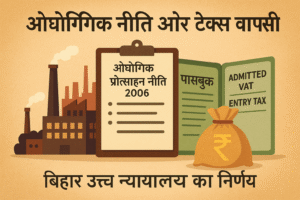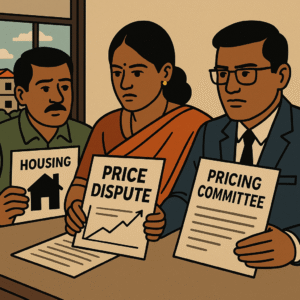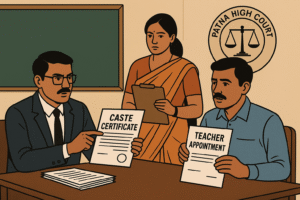Simplified Explanation of the Judgment
The Patna High Court recently addressed a writ petition filed by a contractor challenging a government debarment order that disqualified him from future tenders. The dispute centered around the allegation that the petitioner was debarred without notice or an opportunity to be heard, violating principles of natural justice.
The case was filed under Civil Writ Jurisdiction Case No. 11259 of 2022. The petitioner was a partnership firm, represented by one of its partners. The grievance stemmed from an order dated 07.07.2021 issued by the Rural Works Department, Government of Bihar. According to the petitioner, this order debarring him from participating in government contracts was issued arbitrarily, without any prior notice or show-cause process.
The petitioner highlighted two specific government contracts:
- Agreement No. 05 SBD/18-19 dated 24.05.2018 for ₹6.52 crore.
- Agreement No. 21 SBD/2017-18 dated 17.11.2017 for ₹2.21 crore.
He claimed that he completed the contracted work within the extended timeline approved by the department, and thus, there was no justification for the debarment. He asked the court to:
- Quash the debarment order.
- Restrain the department from disqualifying his future bids based on that order.
- Grant any other appropriate relief.
When the case was taken up for hearing on 15.11.2022 before the bench of Hon’ble the Chief Justice and Hon’ble Mr. Justice Partha Sarthy, the court was not inclined to entertain the writ petition at that stage. Upon realizing the court’s disinclination, the petitioner, through counsel, sought permission to withdraw the writ petition and instead file a representation before the Engineer-in-Chief-cum-Commissioner of the Rural Works Department (Respondent No. 2).
The court permitted the withdrawal and laid out specific directions to ensure the representation is dealt with fairly:
- The petitioner must file the representation within four weeks.
- The department must dispose of it by a reasoned, speaking order within three months.
- The petitioner must be given a fair opportunity of hearing.
- Both sides can submit relevant documents.
- The petitioner is free to pursue further legal remedies if needed, including approaching the court again.
Importantly, the court clarified that it had not examined the merits of the case. All legal questions remain open for future adjudication.
Significance or Implication of the Judgment
This judgment is significant for contractors and vendors engaged in public projects, as it reinforces the principle that administrative debarment must follow due process. A contractor cannot be blacklisted or disqualified arbitrarily. The court emphasized that:
- Any punitive action must follow notice and hearing.
- Administrative actions can be challenged through proper legal channels.
- Writ petitions are not always the first remedy; representations before competent authorities are encouraged.
For the government, this case is a reminder to maintain procedural transparency and fairness in disciplinary actions, especially when they affect business reputation and livelihood.
Legal Issue(s) Decided and the Court’s Decision with Reasoning
- Was the debarment order issued without notice and in violation of natural justice?
- Not decided on merits. The court did not examine this but allowed the petitioner to seek redress through representation.
- Is a writ petition maintainable without first availing departmental remedies?
- Court advised the petitioner to approach the designated authority first and reserved liberty to re-approach the court later.
- Final Outcome:
- Petition was allowed to be withdrawn with liberty to approach the department via representation. Department was directed to consider it expeditiously.
Judgments Relied Upon or Cited by Court
- D.N. Jeevaraj v. Chief Secretary, Govt. of Karnataka & Ors., (2016) 2 SCC 653
- Rural Litigation and Entitlement Kendra v. State of U.P., 1989 Supp (1) SCC 504
- Union of India v. S.B. Vohra, (2004) 2 SCC 150
- Saraswati Industrial Syndicate Ltd. v. Union of India, (1974) 2 SCC 630
Case Title
Parmar Enterprises v. The State of Bihar & Others
Case Number
Civil Writ Jurisdiction Case No. 11259 of 2022
Coram and Names of Judges
Hon’ble the Chief Justice
Hon’ble Mr. Justice Partha Sarthy
Names of Advocates and Who They Appeared For
Mr. Prabhat Ranjan – for the Petitioner
Mr. Kameshwar Pd. Gupta (GP-10) and Mr. Satya Vrat (AC to GP-10) – for the Respondents
Link to Judgment
https://www.patnahighcourt.gov.in/ShowPdf/web/viewer.html?file=../../TEMP/0ab267dc-3ae5-4470-99f3-c49fe446b59f.pdf&search=Debarment
If you found this explanation helpful and wish to stay informed about how legal developments may affect your rights in Bihar, you may consider following Samvida Law Associates for more updates.








